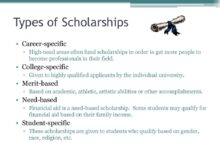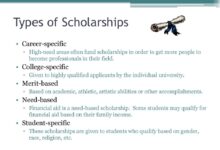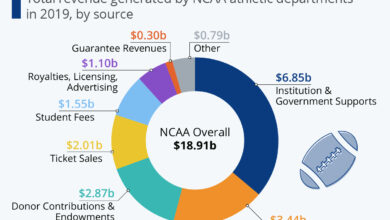Study Abroad For Free: Top Scholarships In 2025 Provides A Comprehensive Guide For Aspiring Students Looking To Pursue International Education Without Financial Constraints.
Study Abroad for Free: Top Scholarships in 2025 sets the stage for this enthralling narrative, offering readers a glimpse into a story that is rich in detail with casual formal language style and brimming with originality from the outset.
For students dreaming of studying abroad without the burden of financial constraints, the year 2025 presents a plethora of opportunities through top scholarships that cater to various fields of study and destinations around the globe. With detailed insights into eligibility criteria, application processes, and financial planning, this guide aims to empower students to explore the world of academia without worrying about the costs involved.
Research on Scholarships
When considering studying abroad, scholarships play a crucial role in making it financially feasible for many students. In 2025, there are several top scholarship programs available that cater to various academic fields and regions around the world. These scholarships provide not only financial support but also valuable opportunities for personal and professional growth.
Top Scholarship Programs in 2025
- Fulbright Scholarship:
- Eligibility Criteria: Open to U.S. citizens with a strong academic record and leadership potential.
- Benefits: Covers tuition, living expenses, and travel costs for one academic year.
- Chevening Scholarship:
- Eligibility Criteria: Available for students from eligible countries who demonstrate leadership qualities.
- Benefits: Fully funded, covering tuition, living expenses, and travel allowance.
- Erasmus+ Scholarship:
- Eligibility Criteria: Open to students from EU member countries for study, training, and research opportunities.
- Benefits: Offers monthly stipend, travel allowance, and insurance coverage.
Application Process
When it comes to applying for scholarships to study abroad for free, the process can seem daunting at first. However, with careful planning and attention to detail, you can increase your chances of securing funding for your education overseas.
Step-by-Step Guide to Applying for Scholarships
- Research and identify scholarships that align with your field of study or interests.
- Read the eligibility criteria and requirements for each scholarship to ensure you qualify.
- Prepare all necessary documents, such as transcripts, recommendation letters, and essays.
- Submit your application before the deadline.
- Follow up with the scholarship providers if necessary.
Tips for Writing Scholarship Essays
- Start early and brainstorm ideas before writing your essay.
- Be authentic and showcase your unique qualities and experiences.
- Follow the essay prompt and structure your essay effectively.
- Edit and proofread your essay multiple times to ensure clarity and coherence.
- Ask for feedback from teachers or mentors to improve your essay.
Securing Recommendation Letters
- Choose recommenders who know you well and can speak to your strengths.
- Provide recommenders with all necessary information and deadlines.
- Follow up with recommenders to ensure they submit their letters on time.
Importance of Meeting Deadlines
Meeting deadlines is crucial when applying for scholarships, as late submissions may disqualify you from consideration. Make sure to stay organized and plan ahead to avoid missing any deadlines.
Search for Scholarships in Your Field of Study
- Utilize scholarship search engines and databases to find opportunities in your field.
- Check with your school’s financial aid office for local and international scholarship options.
- Network with professionals in your field who may know of scholarship opportunities.
Financial Planning
When planning to study abroad, it is crucial to create a comprehensive budget that takes into account tuition fees, living expenses, and travel costs. Proper financial planning can help ensure a smooth and stress-free experience while pursuing your education in a foreign country.
Budget Plan
Before embarking on your study abroad journey, it is essential to calculate all potential costs and create a detailed budget plan. Consider expenses such as tuition fees, accommodation, food, transportation, books, health insurance, and personal expenses. Research the cost of living in the country you will be studying in to get a better understanding of the financial requirements.
- Allocate a specific amount for tuition fees and ensure you have the necessary funds to cover this expense.
- Estimate your monthly living expenses and create a budget for accommodation, food, transportation, and other essentials.
- Include one-time expenses such as visa fees, health insurance, and initial set-up costs in your budget plan.
Managing Finances
Managing finances effectively while studying abroad requires discipline and careful planning. Here are some tips to help you make the most of your money:
- Create a weekly or monthly budget and track your expenses to avoid overspending.
- Look for student discounts and deals to save money on transportation, food, and entertainment.
- Avoid eating out frequently and opt for cooking at home to save on food expenses.
- Consider opening a local bank account in the country you are studying in to avoid high international transaction fees.
Alternative Funding Sources
While scholarships can help cover a significant portion of your expenses, it is essential to explore alternative sources of funding to support yourself financially while studying abroad. Here are some options to consider:
- Part-time job opportunities: Look for part-time job opportunities on campus or in the local community to earn extra income.
- Internships: Consider applying for internships related to your field of study, which can provide valuable work experience and financial compensation.
- Student loans: Explore the possibility of taking out student loans to cover any remaining expenses not covered by scholarships or other funding sources.
- Crowdfunding: Consider setting up a crowdfunding campaign to seek financial support from family, friends, and other supporters.
Choosing the Right Country and University
When deciding to study abroad, choosing the right country and university is crucial to your academic and personal growth. Factors such as educational systems, cultural diversity, and language requirements play a significant role in this decision-making process.
Top Countries and Universities for Scholarships in 2025
Below are some of the top countries and universities that offer scholarships for international students in 2025:
- United States: Harvard University, Stanford University, Massachusetts Institute of Technology (MIT)
- United Kingdom: University of Oxford, University of Cambridge, Imperial College London
- Australia: Australian National University, University of Melbourne, University of Sydney
- Canada: University of Toronto, University of British Columbia, McGill University
Factors to Consider when Selecting a University Abroad
Choosing the right university involves considering various factors to ensure you receive quality education and a fulfilling experience. Some key factors to consider include:
- Program Accreditation: Ensure that the programs offered by the university are accredited and recognized internationally.
- Faculty Expertise: Look into the qualifications and expertise of the faculty members in your chosen field of study to ensure a high-quality learning experience.
- Research Opportunities: Check if the university offers research opportunities and facilities that align with your academic interests and goals.
- Campus Life: Consider the campus environment, extracurricular activities, and support services available to international students for a well-rounded experience.
Cultural Adaptation
Adapting to a new cultural environment while studying abroad can be both exciting and challenging. It is essential to be open-minded, respectful, and willing to embrace new experiences.
Strategies for Cultural Adaptation
- Immerse yourself in the local culture by participating in cultural events and activities.
- Learn the language spoken in the country to facilitate communication and build connections.
- Respect local customs and traditions, even if they are different from what you are used to.
- Seek out opportunities to interact with locals and build cross-cultural friendships.
Importance of Cultural Sensitivity
Cultural sensitivity is crucial when studying abroad to avoid misunderstandings and conflicts. It involves being aware of and respecting the beliefs, values, and practices of the local culture.
Overcoming Culture Shock
- Stay open-minded and patient as you adjust to the new cultural norms and way of life.
- Seek support from fellow international students or mentors who have gone through similar experiences.
- Engage in self-care activities to manage stress and anxiety related to culture shock.
Building Cross-Cultural Friendships
- Be proactive in initiating conversations and getting to know people from different cultural backgrounds.
- Listen actively and show genuine interest in learning about their culture and perspectives.
- Participate in group activities or clubs where you can interact with a diverse group of students.
Academic Expectations
Studying abroad at a university in 2025 comes with high academic rigor and specific expectations that students need to be aware of in order to succeed. It is essential to understand the importance of time management, self-discipline, and seeking academic support when needed to navigate the challenges of coursework in a foreign academic environment.
Importance of Time Management
One of the key factors in excelling academically while studying abroad is effective time management. Balancing coursework, extracurricular activities, and exploring the host country requires careful planning and prioritization.
- Use a planner or digital calendar to keep track of deadlines and assignments.
- Break down larger tasks into smaller, manageable chunks to avoid feeling overwhelmed.
- Set aside dedicated study time each day to stay on top of coursework.
Self-Discipline and Academic Support
Self-discipline is crucial when studying abroad, as there are many distractions and temptations that can impact academic performance. Additionally, knowing when to seek academic support is essential for overcoming challenges and excelling in coursework.
- Establish a study routine and stick to it to maintain productivity.
- Attend office hours or tutoring sessions if you are struggling with course material.
- Join study groups or seek help from classmates to enhance your understanding of complex topics.
Adapting to Different Teaching Styles
Adapting to different teaching styles is a significant aspect of studying abroad, as academic approaches may vary from what you are used to in your home country. Flexibility and an open mind are key to thriving academically in a new learning environment.
- Actively participate in class discussions and engage with professors to gain a deeper understanding of the material.
- Ask questions when you are unclear about a concept or topic to seek clarification.
- Utilize online resources and academic support services provided by the university to enhance your learning experience.
Language Preparation
Language proficiency is crucial for studying abroad as it facilitates communication, academic success, and cultural integration. Improving language skills before embarking on this journey can make the transition smoother and more enriching. Here are some tips and resources to help students prepare for language requirements in their chosen country.
Importance of Language Proficiency
Achieving proficiency in the language of the host country is essential for academic success and cultural immersion. Without adequate language skills, students may struggle to communicate effectively with professors, classmates, and locals. Language proficiency also opens up opportunities for internships, research projects, and social interactions.
Ways to Improve Language Skills
– Enroll in language courses or use online resources like Duolingo, Rosetta Stone, or Babbel.
– Practice speaking with native speakers or language exchange partners.
– Immerse yourself in the language by watching movies, listening to music, or reading books in the target language.
– Create flashcards or vocabulary lists tailored to your field of study to enhance language learning.
– Take language proficiency tests like TOEFL or IELTS to assess your skills and meet university requirements.
Personal Experiences of Learning a New Language
Learning a new language while studying abroad can be challenging but incredibly rewarding. It allows you to connect with people on a deeper level, understand different cultures, and navigate daily life more effectively. Embrace the process and be open to making mistakes as part of the learning journey.
Common Phrases in the Host Country’s Language
– “Hello, how are you?” – “Hola, ¿cómo estás?” (Spanish)
– “Thank you very much!” – “Merci beaucoup!” (French)
– “Excuse me, where is the library?” – “Entschuldigung, wo ist die Bibliothek?” (German)
– “How much does this cost?” – “¿Cuánto cuesta esto?” (Spanish)
– “Can you help me, please?” – “Pouvez-vous m’aider, s’il vous plaît?” (French)
Tips on Overcoming Language Barriers and Cultural Differences
– Be patient with yourself and others as you navigate language barriers.
– Seek out language exchange programs or conversation partners to practice speaking skills.
– Embrace cultural differences and be open to learning from new experiences.
– Stay motivated and consistent in your language learning efforts to see progress.
– Remember that making mistakes is part of the learning process and an opportunity for growth.
Accommodation Options
When studying abroad, one of the crucial decisions to make is choosing the right accommodation. It not only affects your daily life but also contributes to your overall experience in a foreign country.
University Dormitories, Homestays, or Private Rentals
When it comes to accommodation options for international students, there are typically three main choices: university dormitories, homestays, or private rentals. Each option comes with its own set of pros and cons, so it’s essential to consider various factors before making a decision.
Factors to Consider
Factors to consider when choosing accommodation include safety, proximity to the university, cost, and amenities like laundry facilities or meal plans. Safety should always be a top priority, especially for students living in a new and unfamiliar environment. The proximity to the university can greatly impact your daily commute and overall convenience. Cost is another crucial factor, as living expenses can vary significantly depending on the accommodation option. Lastly, amenities like laundry facilities or meal plans can make your daily life more comfortable and convenient.
Tips for Finding Affordable and Comfortable Housing
To find affordable and comfortable housing while studying abroad, consider utilizing student housing services offered by the university. This can often provide cost-effective options that are convenient and safe. Another tip is to look for roommates to share costs, which can significantly reduce the financial burden of living abroad. Additionally, consider public transportation access when choosing accommodation, as this can impact your daily commute and overall mobility.
Table Comparing Pros and Cons
Here is a table comparing the pros and cons of each accommodation option:
| Accommodation Option | Pros | Cons |
|———————-|——|——|
| University Dormitories | – Convenient for students | – Limited privacy |
| Homestays | – Immersive cultural experience | – Lack of independence |
| Private Rentals | – More flexibility | – Higher cost |
Cultural Considerations
When selecting accommodation, it’s essential to take cultural considerations into account. Living with a host family, such as in a homestay, can provide a unique opportunity to immerse yourself in the local culture and language. On the other hand, choosing a more independent living arrangement, like a private rental, can offer a different experience that allows for more autonomy and freedom.
Health and Safety Abroad
When studying abroad, it is essential to prioritize your health and safety to ensure a smooth and successful experience. From understanding health insurance coverage to knowing emergency contacts and local laws, being prepared is key to staying safe and healthy while away from home.
Health Insurance and Healthcare Services
Having adequate health insurance coverage is crucial when studying abroad. Make sure to research and enroll in a comprehensive health insurance plan that covers medical expenses, emergencies, and repatriation. Familiarize yourself with the healthcare system in the host country and know how to access medical services in case of illness or injury.
Staying Healthy and Managing Stress
- Take care of your physical and mental well-being by maintaining a balanced diet, staying active, and getting enough rest.
- Manage stress by practicing self-care techniques such as meditation, exercise, or talking to a counselor.
- Stay connected with friends and family back home to cope with homesickness and seek support when needed.
Safety Measures and Emergency Contacts
Be aware of safety measures in the host country and familiarize yourself with emergency contacts, including local police, ambulance services, and the nearest embassy or consulate.
Travel First Aid Kit Essentials
- Prescription medications with a copy of the prescription
- Basic first aid supplies (bandages, antiseptic wipes, pain relievers)
- Insect repellent and sunscreen
- Emergency contact list
- Health insurance information
Food and Water Safety
Understand food and water safety practices in the host country to prevent foodborne illnesses and dehydration. Stick to bottled water and avoid consuming raw or undercooked foods.
Registering with the Local Embassy or Consulate
Register with the local embassy or consulate upon arrival in the host country to receive important updates, travel alerts, and assistance in case of emergencies. Provide your contact information and study details for easy communication.
Networking and Social Integration
Building a social network and integrating into a new environment is crucial for a fulfilling study abroad experience. Here are some strategies to help you connect with local and international students, participate in student clubs, and create opportunities for career development while studying abroad.
Strategies for Building a Social Network
- Attend orientation events and welcome activities to meet new people.
- Join student clubs, cultural groups, or sports teams to engage with peers who share similar interests.
- Volunteer for community activities or events to meet locals and contribute to your host country.
Benefits of Social Integration
- Enhances cultural understanding and appreciation.
- Provides a support system during your time abroad.
- Opens doors to new friendships and networking opportunities.
Professional Networking and Career Development
- Attend career fairs, workshops, and networking events to connect with professionals in your field.
- Join LinkedIn groups and online communities to expand your professional network.
- Participate in internships or part-time jobs to gain practical experience and build your resume.
Approaching New People and Initiating Conversations
- Smile and introduce yourself with a friendly greeting.
- Ask open-ended questions to show interest in the other person.
- Find common ground or topics to discuss, such as classes, hobbies, or travel experiences.
Balancing Social Activities with Academic Responsibilities
- Create a study schedule and prioritize important assignments and exams.
- Set aside dedicated time for social events and activities to maintain a healthy balance.
- Communicate with classmates and professors about your availability for group projects or study sessions.
Importance of Maintaining Relationships for Academic Support
- Collaborate with classmates on group projects and study groups for academic success.
- Seek guidance from professors for mentorship and career advice.
- Stay in touch with friends and connections even after your study abroad experience for future networking opportunities.
Travel Opportunities
Traveling while studying abroad offers students a unique chance to immerse themselves in new cultures, gain valuable experiences, and develop important skills for their future careers. Whether through cultural exchange programs, internships abroad, or attending international conferences, the benefits of travel are endless.
Cultural Exchange Programs
Participating in cultural exchange programs allows students to live with local families, attend language classes, and engage in community activities. This immersive experience helps develop adaptability, language skills, and a deeper understanding of different cultures.
Internships Abroad
Internships abroad provide students with hands-on experience in their field of study while navigating a new work environment. This not only enhances their resume but also fosters cross-cultural communication skills and expands their professional network globally.
International Conferences
Attending international conferences exposes students to cutting-edge research, diverse perspectives, and networking opportunities with professionals from around the world. It helps broaden their knowledge base, build confidence, and stay updated on global trends in their field.
Recommendations for Immersive Travel Experiences
For a truly immersive travel experience, students can consider living with a host family, volunteering in local communities, or participating in cultural workshops. These activities not only enhance cultural understanding but also foster personal growth and empathy towards others.
Navigating Cultural Differences
To navigate cultural differences effectively, students should approach each interaction with an open mind, respect local customs, and be willing to learn from others. Developing intercultural communication skills is key to building meaningful relationships and thriving in diverse environments.
Maximizing Learning Opportunities While Traveling
To make the most of their travel experiences, students should engage in local activities, explore off-the-beaten-path destinations, and seek opportunities to interact with locals. Keeping a travel journal, reflecting on their experiences, and sharing stories with peers can further enrich their learning abroad.
Academic and Career Development
Studying abroad can have a profound impact on academic growth, personal development, and career prospects. Students who embark on international education journeys often develop a broader perspective, critical thinking skills, and cultural awareness that can significantly enhance their academic performance and future career opportunities.
Impact of Studying Abroad
- Exposure to diverse academic approaches and teaching styles
- Development of intercultural communication skills
- Enhanced adaptability and resilience in unfamiliar environments
- Expanded global network for future career opportunities
Success Stories
- A student who completed an internship abroad landed a full-time job at a multinational company
- Another student conducted research overseas leading to publication in an international journal
- Many alumni credit their study abroad experience for their successful career paths in global industries
Challenges Faced by Students
- Language barriers affecting academic performance
- Differences in grading systems and academic expectations
- Cultural adjustment impacting classroom participation
- Navigating unfamiliar academic resources and support services
Cross-cultural Communication Skills
- Essential for collaborating with diverse teams on academic projects
- Facilitates networking with professionals from different cultural backgrounds
- Critical for adapting to global work environments post-graduation
Strategies for Balancing Academic Responsibilities
- Set realistic goals for academic achievements and cultural exploration
- Create a study schedule that allows time for both coursework and cultural activities
- Engage in language exchange programs to improve proficiency while studying
- Seek academic support services for assistance in managing workload and stress
Role of Language Proficiency
- Opens up opportunities for internships and research projects in local institutions
- Enhances academic performance in courses conducted in a foreign language
- Improves communication with professors, peers, and potential employers
Alumni Network and Support
Connecting with alumni networks and utilizing support services is crucial for students studying abroad. These networks offer a wealth of opportunities for mentorship, guidance, and valuable connections that can significantly impact a student’s academic and professional journey.
Benefits of Alumni Support
- Access to mentorship: Alumni can provide insights, advice, and guidance based on their own experiences, helping current students navigate challenges and make informed decisions.
- Career guidance: Alumni networks often offer career development resources, job opportunities, and networking events to help students kickstart their careers post-graduation.
- Networking opportunities: Alumni events and gatherings provide a platform for students to connect with professionals in various industries, expanding their network and opening doors to new possibilities.
Tips for Leveraging Alumni Connections
- Stay connected: Keep in touch with fellow alumni through social media, alumni platforms, or regular meetups to maintain relationships and stay updated on opportunities.
- Attend alumni events: Participate in alumni gatherings, workshops, and networking events to build connections, gain insights, and explore potential career paths.
- Seek advice: Don’t hesitate to reach out to alumni for advice, recommendations, or support when needed. Their experiences can offer valuable lessons and insights for your own journey.
Cultural Immersion and Experiences
Immersing yourself in the local culture while studying abroad can be a transformative experience. By engaging with traditional dances, music, art forms, festivals, cuisine, and community service, you can gain a deeper understanding of your host country.
Engaging in Local Festivals and Events
Attending local festivals and events is a great way to immerse yourself in the culture of your host country. These celebrations offer insight into the traditions, beliefs, and values of the local community. Participating respectfully can enhance your cultural experience and create lasting memories.
- Research upcoming festivals and events in your host country.
- Learn about the significance of each celebration and the customs associated with them.
- Participate in activities, workshops, or performances during the events.
- Respect local customs and traditions while attending festivals.
Learning the Local Language
Understanding the local language can greatly enrich your cultural immersion experience. By learning basic phrases and engaging in conversations with locals, you can build connections, gain insights, and navigate daily life more effectively.
- Take language classes or use language learning apps to improve your skills.
- Practice speaking with locals and ask for feedback to enhance your proficiency.
- Immerse yourself in conversations, cultural exchanges, and language exchange programs.
- Be open to making mistakes and embrace the learning process.
Exploring Authentic Local Cuisine
Food is an integral part of culture, and trying authentic local cuisine can offer a taste of the region’s culinary heritage. By sampling traditional dishes, you can appreciate the flavors, ingredients, and stories behind each meal.
- Visit local markets, eateries, and street vendors to discover new dishes.
- Engage with locals to learn about the cultural significance of different foods.
- Experiment with cooking traditional recipes or take a cooking class to learn more about the cuisine.
- Be open to trying new flavors and expanding your culinary horizons.
Engaging in Community Service Projects
Participating in community service projects can deepen your cultural immersion experience and foster connections with the local community. By contributing to meaningful initiatives, you can make a positive impact, learn about local challenges, and build empathy.
- Volunteer with local organizations focused on cultural preservation, environmental conservation, or community development.
- Participate in service-learning opportunities that combine academic study with practical experience.
- Engage in projects that address social issues and contribute to sustainable development.
- Reflect on your experiences, challenges, and personal growth throughout the service projects.
Reflection and Future Goals
Reflecting on your study abroad experience is crucial for personal growth and setting future goals. It allows you to assess the impact on your personal, academic, and career development. Moving forward, incorporating your international experience into your future endeavors can greatly enhance your opportunities for success.
Incorporating International Experience
After studying abroad, consider how you can leverage your newfound skills and knowledge in your academic and professional pursuits. Here are some strategies to help you incorporate your international experience into your future goals:
- Highlight your study abroad experience on your resume and in job interviews to showcase your adaptability, cross-cultural communication skills, and global perspective.
- Seek opportunities for internships or research projects that align with your study abroad experience and allow you to further develop your international competencies.
- Consider pursuing graduate studies in a related field to deepen your expertise and continue building on the academic foundation you established during your time abroad.
Setting Post-Study Abroad Goals
As you return from your study abroad program, it’s important to set clear goals for your future endeavors. Here are some tips to help you navigate post-study abroad goal setting:
- Reflect on the skills and knowledge you gained during your study abroad experience and identify how you can apply them to your academic and career pursuits.
- Establish short-term and long-term goals that align with your aspirations and leverage the international perspective you acquired while studying abroad.
- Stay connected with the international community you engaged with during your time abroad to continue expanding your network and exploring global opportunities.
Ultimate Conclusion
As you embark on this journey towards studying abroad for free with the help of top scholarships in 2025, remember that the world is your oyster, and education knows no bounds. Seize the opportunity, embrace the challenges, and let your academic aspirations take flight into a realm of endless possibilities.









